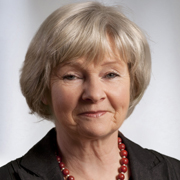Wickman-Parak: Independence, inflation targeting and the importance of not being dead certain
On Wednesday, Deputy Governor Barbro Wickman-Parak held her final speech as member of the Riksbank’s Executive Board. During a breakfast meeting at SEB, Ms Wickman-Parak talked from a central banker's perspective about the importance of not being dead certain about things, but remaining open to reconsidering the prevailing views. She observed that it is surprising how much has changed merely during the six years she has been on the Board. In the wake of the global financial crisis, an international debate has arisen on monetary policy and the role played by central banks. Ms Wickman-Parak's speech focused on two areas that have come up on the agenda again - central banks' independence and inflation targeting.
 She noted that monetary policy was delegated to independent central banks during a period when both instruments and objectives were clearly defined. The task was in principle to keep inflation low and stable with the aid of the policy rate. In recent years the situation has become more complicated, partly because some measures taken by central banks border on fiscal policy. There are also discussions on giving central banks a larger role with regard to trying to prevent future financial crises. If the central banks' tasks are extended to areas beyond traditional monetary policy and they are given more instruments than just the policy rate, it will be more difficult to define their independence, said Ms Wickman-Parak.
She noted that monetary policy was delegated to independent central banks during a period when both instruments and objectives were clearly defined. The task was in principle to keep inflation low and stable with the aid of the policy rate. In recent years the situation has become more complicated, partly because some measures taken by central banks border on fiscal policy. There are also discussions on giving central banks a larger role with regard to trying to prevent future financial crises. If the central banks' tasks are extended to areas beyond traditional monetary policy and they are given more instruments than just the policy rate, it will be more difficult to define their independence, said Ms Wickman-Parak.
With regard to inflation targeting, she noted that it had succeeded well in its main task - supplying a credible nominal anchor. She felt that the criticism that inflation targeting had not succeeded in preventing the crisis and that it had provided an obstacle to the recovery was unfair. Rather than interpreting the slow global recovery as a failure for monetary policy, perhaps one should see it as the shock was so powerful that it would have been difficult for monetary policy to manage in a different and better way, regardless of what forms the policy had been conducted under.
However, Ms Wickman-Parak went on, even if inflation targeting does not need to be replaced by something new, there may be reasons to modify it, and also to modify the tasks of the central banks. One conclusion reached by several analysts is that central banks should be more clearly allocated the task of trying to prevent financial imbalances from building up to avoid the sort of development we have seen in recent years. This could result in the framework for central banks becoming both slightly more flexible in the future and slightly more complex than before, which Ms Wickman-Parak considered fairly logical and natural, given the events in recent years. As she pointed out, however, this raises questions regarding the independence of the central banks.
"It is without doubt a rather revolutionary period we are in and it will be very interesting to follow how central banks and their activities develop over the next ten years - even if I myself will be watching from the side-lines," concluded Ms Wickman-Parak.
Read the entire speech.